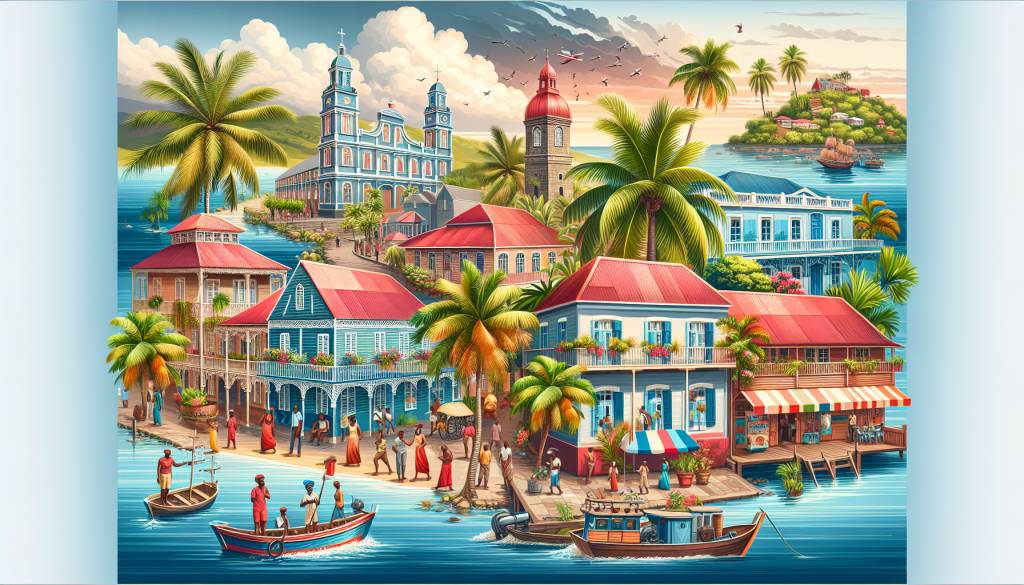Exploring the Essence of Creole Culture in Martinique
The island of Martinique, a jewel in the crown of the Caribbean, is as rich in culture as it is in its stunning natural beauty. At the very heart of this French overseas department beats an intriguing Creole culture, a tapestry woven from a diverse historical thread comprising African, French, Amerindian, and even Asian influences. Understanding Creole culture is essential for anyone looking to fully experience the uniqueness of Martinique and to appreciate the depth of its identity.
The Roots of Martinican Creole Heritage
Creole culture in Martinique, distinct yet interconnected with broader Caribbean culture, originated in the colonial era when the island was a hub for European colonialists and African slaves. This cultural crucible has led to a vibrant and resilient Creole identity, which has over time integrated various elements from the many people that have come to call the island their home. It’s a culture that has been shaped by oppression and liberation, suffering, and joy, resulting in a distinct way of life that endures to this day.
Language: The Voice of Martinican Identity
The French language is official in Martinique, but it is the Creole language that is the true verbal embodiment of its culture. Creole, or ‘Kréyol’, is not merely a dialect but a language born from French and infused with terms from West African, English, and indigenous Carib languages. It represents the island’s multilingual backdrop and serves as a potent symbol of resistance and self-expression among Martinicans.
Cuisine: A Flavorful Fusion of Influences
The amalgamation of various cultural influences is evident in the delectable Creole cuisine of Martinique. It features a variety of ingredients such as seafood, tropical fruits, and root vegetables, combined with an array of spices that tease and tantalize the palate.
- Traditional dishes such as ‘Colombo’ (a spicy stew) reflect South Asian influences
- ‘Accras de Morue’ (salt cod fritters) showcase Martinican innovation with seafood
- ‘Boudin Créole’ (Creole blood sausage) illustrates the melding of French and Caribbean tastes
Each dish serves as a historical chapter, telling the story of the island’s past with every bite.
Music and Dance: The Rhythmic Expression of Martinican Spirits
Music and dance are indispensable facets of Martinican Creole culture. The island’s music, deeply rooted in its historical journey, is a sonic representation of its soul. ‘Zouk’ music, globally recognized, traces its origins back to Martinique and Guadeloupe, while traditional styles like ‘Bèlè’ bear a more direct connection to African rituals and French ballroom dancing. Dance, in itself an act of storytelling, is a central component of cultural and religious festivals, communicating the island’s history and collective memories.
Religion and Spirituality: A Mélange of Beliefs
Religion and spirituality in Martinique are characterized by a syncretism of Catholicism and African diasporic religions. The official religion may be Roman Catholicism, due to the French influence, but many Martinicans blend these practices with elements of Vodou, a testament to the resilience of African spirituality amidst colonial imposition.
Religious observances in Martinique are not just acts of faith but also demonstrations of cultural identity and community solidarity, with large processions and vibrant public celebrations such as the annual Carnival.
Arts and Literature: A Canvas of Creole Complexity
Creole culture shines through Martinique’s art and literature. Artists and writers from Martinique, such as Aimé Césaire and Frantz Fanon, have played pivotal roles in shaping global thought on post-colonialism and black identity. The island’s literature, often characterized by the use of Creole language, presents a narrative of resistance, resilience, and self-affirmation. Similarly, visual arts in Martinique, often evocative and colorful, explore themes of heritage, identity, and the intricacies of Creole life.
The Impact of Creole Culture on Tourism
Tourism in Martinique flourishes, with Creole culture being a significant draw for visitors. Enthusiasts of history and culture flock to the island to immerse themselves in its distinctive lifestyle. The hospitality industry in Martinique, aware of the cultural richness, offers experiences that honor Creole traditions, from cooking classes to cultural tours, showcasing the vibrant local traditions and fostering a deeper appreciation among tourists.
Preservation and Evolution of Creole Culture
While Creole culture in Martinique is celebrated, it is also a culture in constant evolution, adapting to modern influences while holding steadfast to its roots. The people of Martinique are proactive in preserving their heritage through education, cultural events, and language revitalization programs. This dynamic between preservation and evolution makes the Creole culture of Martinique an ever-fascinating subject for cultural enthusiasts and a vital component of the island’s identity.
In this exploration of Martinique’s heartbeat — its Creole culture — we find a world that is as complex as it is beautiful, full of history, passion, and a vibrant spirit that captivates all who encounter it. Whether sampling the cuisine, swaying to the rhythm of its music, or delving into its rich traditions, understanding Creole culture is key to experiencing the true soul of Martinique.




